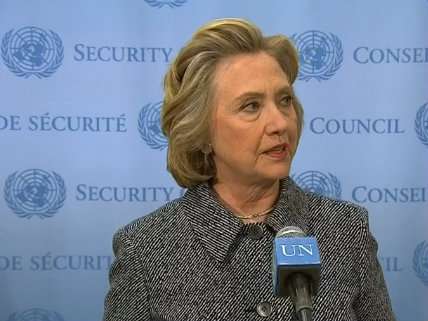Hillary Clinton's Goldman Sachs Speeches Are Probably Boring. That's Why It's So Telling That She Won't Release Them.
Clinton's unwillingness to release the transcripts is another sign of her longstanding resistance to transparency.

The first time a reporter asked Hillary Clinton whether she would release the transcripts to her speeches to Goldman Sachs, for which she recieved a total of $675,000 she just laughed. The idea was silly, absurd, a joke — and not even worth considering.
At Thursday night's Democratic debate in New Hampshire, Clinton was asked again whether she would release the speeches, with moderator Chuck Todd relaying a question that had been sent in, and then expanding the question, asking Clinton whether she would release the transcripts to every one of her paid speeches.
Clinton didn't laugh this time. Instead, she said she didn't know the status of the transcripts, but would "look into it." And then she took off on a response arguing, essentially, were beside the point, transitioning by saying, "My view on this is look at my record."
Perhaps I'm missing something, but aren't Clinton's many paid speeches part of, well, her record? After all, Clinton has said that they came to her for her wisdom as a former principal in the Obama administration, that they valued her insight and her experience as major player in world affairs, meaning that they were clearly linked to her public service.
"I did go on the speaking circuit," she said at the debate. "I spoke to heart doctors, I spoke to the American Camping Association, I spoke to auto dealers, and yes, I spoke to firms on Wall Street. They wanted me to talk about the world, what my experience had been as secretary of state." One attendee at a Goldman session confirmed to The New York Times that Clinton's speech was basically a "tour of the world" in which she discussed trouble-spot countries like China, Russia, and Iran, as well as political dysfunction in Washington, D.C.
My guess is that Clinton's speeches were probably pretty anodyne, filled with versions of the same sorts of insights she's shared in interviews with journalists and at public events many times. While I have never attended a Goldman Sachs event or a paid Hillary Clinton speech, I've occasionally gone to dinners and gatherings in Washington, D.C. featuring remarks by some powerful person or another, and almost invariably their remarks are not particularly newsworthy.
The speaker flatters the room, talks about whatever it is they're working on or concerned about at the moment, and, usually, relates it to something in the news. These events tend not to contain startling revelations, and generally speaking they're not particularly newsworthy, at least in terms of new or surprising announcements or details. The opposite, in fact, is true: Paid speeches to big groups often seem designed not to make news. (There are better forums for that.) So I doubt that Clinton's Goldman remarks started with a tribute to big banks and an invocation to salute the Wall Street-Washington conspiracy.
The all-but-required flattery portion might be a little trouble for Clinton, I suppose, since she's now trying to pose as tough on Wall Street. ("No one will regulate Wall Street more strictly than her," is a typical spokesman statement on the matter.) But the actual political content of her words is, if anything, likely to be pretty bland.
And that's why Clinton's unwillingness to release the transcripts is so strange, and so revealing. As with Clinton's emails, the issue is not the content in question so much as the way she has handled it, and her knee-jerk resistance to transparency.
Indeed, Clinton seems to have built that resistance into her speech contracts, several of which, as Buzzfeed reports, give Clinton sole rights to all reprints, reuse, and transcripts, making the speeches hers and hers alone to release, or hide. It's as if an effort was made to make sure that no one else could ever reproduce the transcripts without her permission. Again, there's a similarity here to her emails, where she made the decision to host all of her State Department email communications on a private, homebrew server that the Clintons fully controlled, one that she initially said she would not turn over for inspection.
The story here isn't that Clinton went to Wall Street and was paid hundreds of thousands of dollars to go easy on financial regulation. It's that when asked to share almost-certainly-bland remarks already made to dozens of people, she tries to avoid doing so, and turns out to have taken steps long ago to ensure that no one else could so without her permission.
That essential instinct for secrecy and information control appears to have guided her during her time as Secretary of State, and in her lucrative speech-giving as a private citizen. You can see the same instinct at work, as well, in the Clinton Foundation's lack of follow-through on an explicit agreement with the Obama administration to disclose all of its donors, and the Foundation's misleading excuses when asked about its failures to disclose.
This pattern of resistance to transparency has followed Hillary Clinton for years, in her work for the government, in her foundation's philanthropic work, and in her private business. There is every reason that it would follow her into the White House too.


Show Comments (97)